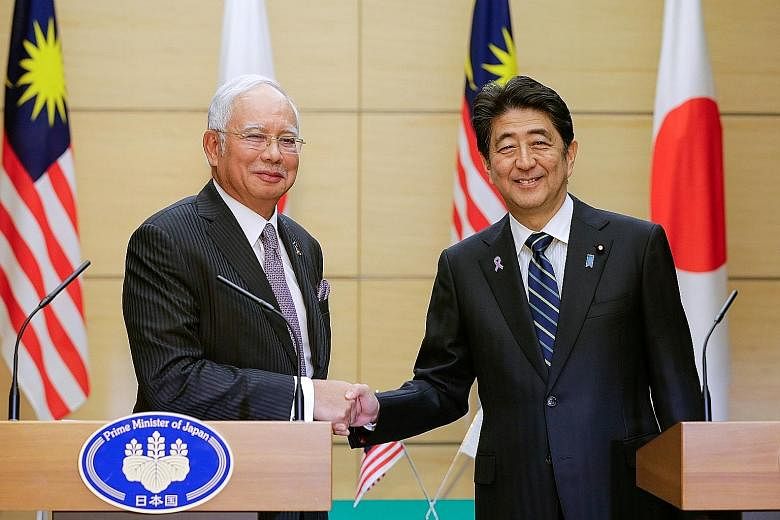With a lucrative high-speed rail project on the line, Japanese Prime Minister Shinzo Abe yesterday made a strong sales pitch for his country's shinkansen bullet train technology at a meeting with his Malaysian counterpart Najib Razak.
The pitch was similar to the one Mr Abe made when he met Prime Minister Lee Hsien Loong in Tokyo in September. The two South-east Asian neighbours are working towards signing an agreement for the 350km rail, with a top speed of more than 300kmh, at the annual leaders' retreat next month.
Datuk Seri Najib said yesterday that an international tender will be called by the fourth quarter of next year.
The high-speed rail, which is expected to cost more than $17 billion, will slash travelling time between Singapore and Kuala Lumpur to just 90 minutes, compared to the current four- to five-hour road journey.
"We had a very good discussion, and I expressed strong expectation regarding the adoption of Japan's bullet train technology," Mr Abe said as the Malaysian PM stood next to him.
Mr Najib, in turn, said he appreciated the long record of safety and reliability of the shinkansen. "I have reassured (Mr Abe) that the process to arrive at the final decision (on the contract) would be done in an open, transparent and objective manner," he added.
Japan is drawing up a special financing package for its bid, Malaysia's The Star reported yesterday. If its bid is successful, Japan vowed to transfer its bullet train expertise to Malaysia and Singapore.
Japan's envoy to Malaysia Makio Miyagawa said: "We want you to be able to operate the high-speed rail on your own from the first day. And we want to create a good partnership with Malaysian industries."
University of Tokyo's international relations professor Heng Yee Kuang noted that Mr Abe has called himself "Japan's top salesman in pushing its infrastructure exports overseas".
Japan and China are seen as among the leading contenders for the railway, which is expected to begin construction in 2018 and start operations in 2026.
Last year, Japan lost a bid to China for a high-speed rail development in Indonesia, and Dr Heng said Malaysia and Singapore may be monitoring the progress of that project for their subsequent decision on the award.
Mr Najib's three-day working visit to Tokyo, which ends today, comes a mere two weeks after he signed 14 cooperation pacts worth RM144 billion (S$46.5 billion) on a six-day trip to Beijing.
On that trip, he agreed to buy four Chinese patrol boats in Malaysia's first significant defence deal with China.
Japan yesterday agreed to give Malaysia two used coast guard patrol vessels, following a request by the country's maritime agency to "meet its urgent need of enhancing its capacity for further ensuring the maritime safety and security", Tokyo said yesterday. One vessel will be deployed to Kuantan, and the other, to Kota Kinabalu.
Malaysia is one of four South-east Asian countries with conflicting territorial claims in the South China Sea with China, and Mr Najib yesterday welcomed Japan's move as one that reflects the "broad-based" nature of bilateral ties."Malaysia continues to play its part to ensure the South China Sea will be an area of peace and stability, without which we cannot achieve prosperity," he said.
Mr Najib, who is also Finance Minister, said Malaysia is "on the same page" as Japan when it comes to the 12-nation Trans-Pacific Partnership, which now appears unlikely, given American President-elect Donald Trump's protectionist stance. Talks between Mr Abe and Mr Trump in New York today (tomorrow, Singapore time) are "very much awaited" by all signatories of the pact, Mr Najib said, adding that he hopes Mr Trump will come to recognise the pact's strategic importance.
Earlier yesterday, Mr Najib made a pitch for investments at a lunch with Japanese business leaders, saying Malaysia is "no longer competing at the low technology level. We're moving up the value chain and looking at higher-paying jobs".
Last year, Japan was Malaysia's fourth-largest trading partner.

